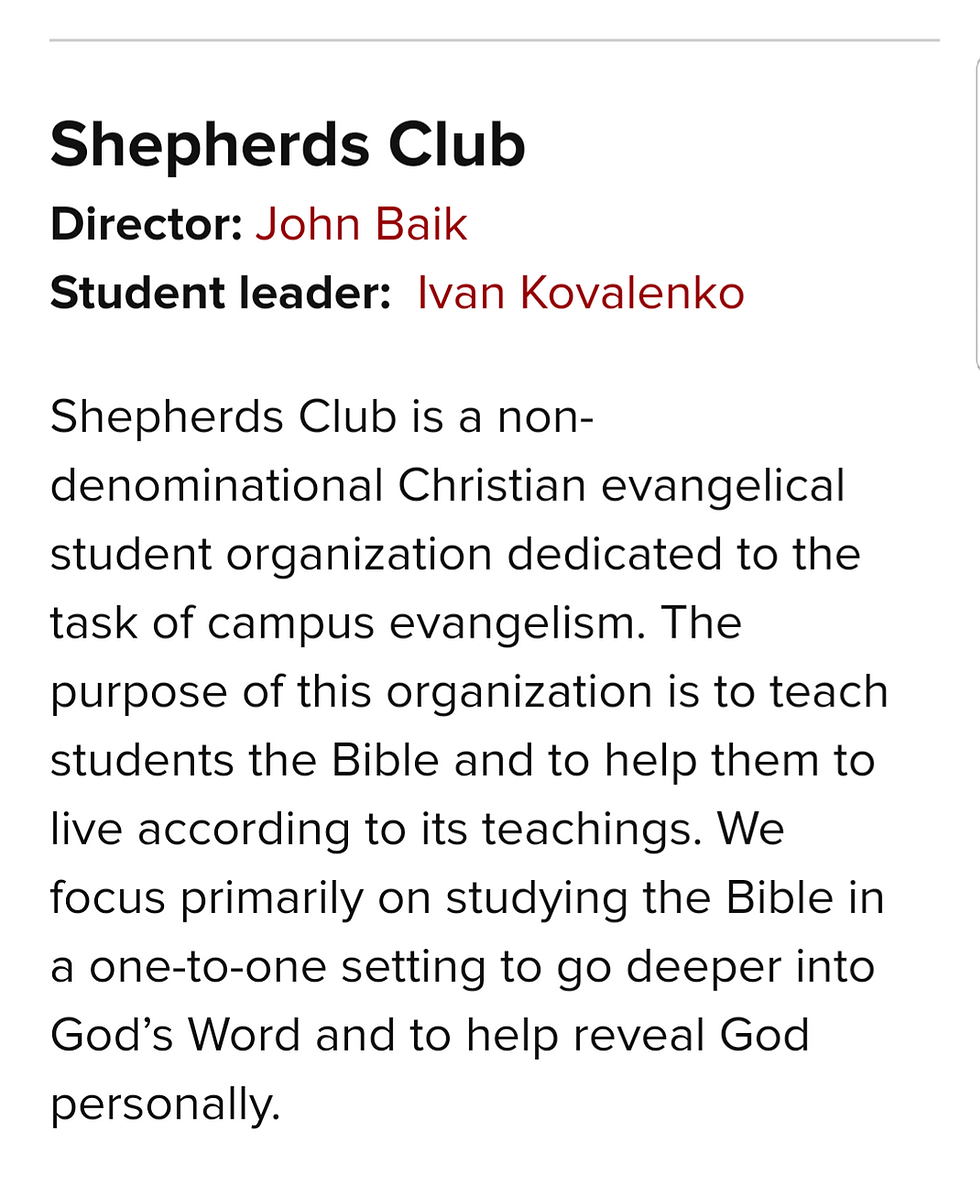Why doesn't UBF befriend/align themselves with anti-cult groups???
- Eric Navas
- Aug 2, 2018
- 3 min read
This is a UBF theory.
Something that came across my mind that I haven't thought about before Why doesn't UBF befriend/align themselves with anti-cult groups? By anti-cult groups I'm talking about Cult watch groups and cult deprogrammers.
UBF apologetics would say that UBF won't do so because it would be compromise.
However UBF has compromise before on several occasions and still do.
1. Some current UBF members talk to ex-members: http://ubfriends.org/index.php/blog/what-do-you-think-now
2. UBF has invited guest speakers from churches outside of UBF despite criticizing them: http://ubf.org/about/endorsements In fact two of those guest speakers will reoccur in the upcoming international conference, John Armstrong and Scott Moreau. Go to Interest Group number 3 topic 8 and Interest Group number 1 topic 4 http://hiskingdom2018.org/about-us-basic/accordions-2-2/ig-interest-group/#1522100554811-6274fd03-40fd
UBF has continued to deny the cult label and has even criticized other cults such as ICC/ICOC and Jehovah's Witnesses to name a few. Yet, UBF doesn't invite anti-cult groups/leaders liek Steven Hassan and Rick Alan Ross to UBF conferences, Sunday services, and the like. Why???
Here's where the theory comes on. The reason why is because UBF would need to disprove that they never did and to this day don't have not even one characteristic trait of a cult. The following is all the characteristic traits of any cult:
Is it a Cult? The Top Ten Signs the ‘Group’ You’ve Joined is Not what It Seems
The leader and group are always correct and anything the leader does can be justified.
Questions, suggestions, or critical inquiry are forbidden.
Members incessantly scramble with cramped schedules and activities full of largely meaningless work based on the leader’s agenda
Followers are meant to believe that they are never good enough.
Required dependency upon the leader and group for even the most basic problem-solving.
Reporting on members for disobedient actions or thoughts is mandated and rewarded.
Monetary, sexual, or servile labor is expected to gain promotion.
The ‘outside’ world — often including family and friends — is presented as rife with impending catastrophe, evil, and temptations.
Recruitment of new members is designed to be purposefully upbeat and vague about the actual operations of the leader and group.
Former members are shunned and perceived as hostile.
Source: https://www.huffingtonpost.com/jayanti-tamm/the-c-word_2_b_848340.html
SOCIOLOGICAL CHARACTERISTICS OF CULTS
I noted previously that even though cults should be defined from a theological point of view, we can nevertheless gain valuable insights into certain aspects of the cultic mentality from sociology. . . .
[1] Authoritarian Leadership
Authoritarianism involves the acceptance of an authority figure who exercises excessive control on cult members. As prophet or founder, this leader’s word is considered ultimate and final. . . .
Often this authoritarianism involves legalistic submission to the rules and regulations of the group as established by the cult leader (or, as in the case of the Jehovah’s Witnesses, submission to the Watchtower Society). Cult members are fully expected to submit, even if they do not agree with the requirements. Unquestioning obedience is compulsory.
[2] Exclusivism
Cults often believe that they alone have the truth. The cult views itself as the single means of salvation on earth; to leave the group is to endanger one’s soul. . . .
[3] Isolationism
The more extreme cults sometimes create fortified boundaries, often precipitating tragic endings (we have already mentioned the tragedies in Waco and Jonestown). Some cults require members to renounce and break off associations with parents and siblings. . . .
[4] Opposition to Independent Thinking
Some cultic groups discourage members from thinking independently. The “thinking,” as it were, has already been done for them by the cult leadership; the proper response is merely to submit. . . .
[5] Fear of Being “Disfellowshiped”
It is not uncommon in cults that people are urged to remain faithful to avoid being “disfellowshiped,” or disbarred, from the group. Again, the Jehovah’s Witnesses are a prime example, for a person can be disfellowshiped merely for questioning a Watchtower doctrine. . . .
[6] Threats of Satanic Attack
Finally, some cults use fear and intimidation to keep members in line. Members may be told that something awful will happen to them should they choose to leave the group. Others may be told that Satan will attack them and may even kill them, for they will have committed the unpardonable sin. Such fear tactics are designed to induce submission. Even when people do muster enough courage to leave the group, they may endure psychological consequences and emotional baggage for years to come-- Source: http://andynaselli.com/sociological-characteristics-of-cults


Comments